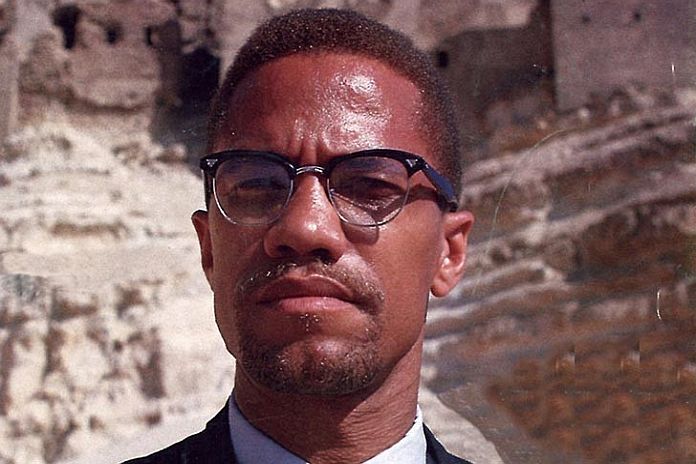By Earl Bousquet
As I continued my annual dig into Malcolm X facts ahead of the 55 anniversary of his assassination on the day before Saint Lucia observes its Independence Day this year, I was interested in Malcolm’s take on the movement for Reparations in the USA.
So, I searched the search engines… Initially, my usual attraction to numbers fell on the following…
Despite his assassination at New York’s Audubon Ballroom on February 21, 1965, fascination with civil rights leader Malcolm X continues to this day, which, in the age of the Internet, can be tracked by the number of Google searches about the Muslim minister named El-Hajj Malik El-Shabazz.
The Internet giant reports 673,000 searches under his name – and interest in his racial background can also be tabulated.
Information about his family is Googled approximately 3,260 times per month, and the total number of searches about his race heritage add up to over 50,000 per year.
‘X’ was born Malcolm Little on May 19, 1925, in Omaha, Nebraska, the fourth of seven children.
His father, Reverend Earl Little, was an African American Baptist minister from Reynolds, Georgia and his mother, Louise Little, was born in Grenada, but whose background was very different from her husband’s.
She was an educated woman of mixed heritage and her father was white, so she was light-skinned. She ‘looked like a white woman’, Malcolm recalled in his autobiography, ‘She had straight black hair, and her accent did not sound like a Negro’s’.
The civil rights leader’s mother never met her father and was ashamed of her link to him, and Malcolm came to resent the genetic legacy that had awarded him his light skin and red hair.
‘I learned to hate every drop of that white rapist’s blood that is in me,’ he said.
Ahead of a Reparations webinar that’ll coincide with his 55th birth anniversary, I also found that Malcolm X and the Nation of Islam had called for Reparations way back in 1963 while speaking at Michigan State University.
First, he called for Black Americans to be able to go back to Africa:
“Number one… every effort on the part of the government up till now to solve this problem by bringing about a just, equitable situation between whites and Blacks mixed up together here in this house has failed – has failed absolutely. So… since you can’t give the Negro justice in your house, let us leave this house and go back home.”
But being that it might not be possible for a mass relocation to Africa, the Nation had another proposal for the US government.
“Give us part of this country and let us live in that part,” said Malcolm X.
“…In this section that will be set aside for Black people… the government should give us everything we need to start our own civilization. They should give us everything we need to exist for the next twenty-five years… Besides land, back wages for free, enslaved labor is due to the descendants of slaves,” Muhammad felt.
Malcolm X explained further: “This is what you should realize. The greatest contribution to this country was that which was contributed by the Black man. If I take the wages… of everyone here, individually it means nothing, but collectively all of the earning power or wages that you earned in one week would make me wealthy. And if I could collect it for a year, I’d be rich beyond dreams. Now, when you see this, and then you stop and consider the wages that were kept back from millions of Black people, not for one year but for 310 years, you’ll see how this country got so rich so fast.”
Malcolm X thoughts were further explained in his posthumously published book, By Any Means Necessary.
In it, he wrote: ‘“If you are the son of a man who had a wealthy estate and you inherit your father’s estate, you have to pay off the debts that your father incurred before he died. The only reason that the present generation of white Americans are in a position of economic strength… is because their fathers worked our fathers for over 400 years with no pay… We were sold from plantation to plantation like you sell a horse, or a cow, or a chicken, or a bushel of wheat…All that money… is what gives the present generation of American Whites the ability to walk around the earth with their chest out… like they have some kind of economic ingenuity. Your father isn’t here to pay. My father isn’t here to collect. But I’m here to collect and you’re here to pay…’”
Five-and-a-half decades later, the US Congress earlier this week yet again looked at the HR-40 Bill, still appearing unwilling to deliver on the outstanding centuries of long-overdue debts of at least ‘40 acres and a mule’ worth of Reparations debts (by today’s calculations) to each African American.
The Saint Lucia National Reparations Committee (NRC) will on February 21 – the day before Saint Lucia’s 42nd Independence Anniversary, host a webinar on ‘Reparations for the Caribbean and The Diaspora’ to bring some 57,000 Saint Lucians in The Diaspora in on the Reparations discussion taking place back home.
Saint Lucians, Grenadians and others in The Caribbean Diaspora in the USA helped produce the likes of Marcus Garvey (as we now know him), Malcolm X, Kwame Ture (Stokely Carmichael) and Harry Belafonte who, at 92, still identifies with Reparations causes in America.
Same with so many other countries where Caribbean people have also quietly carved their name in stone.
Sunday’s online event should therefore interest not only Saint Lucians, but Caribbean people generally, if only because Reparations is not only for Saint Lucians, but for all Caribbean people, at home and abroad.





